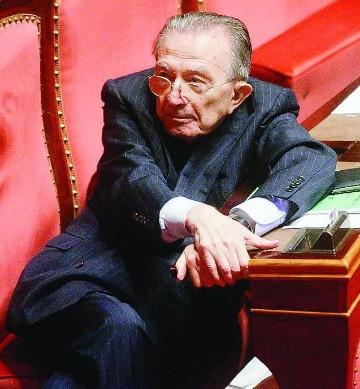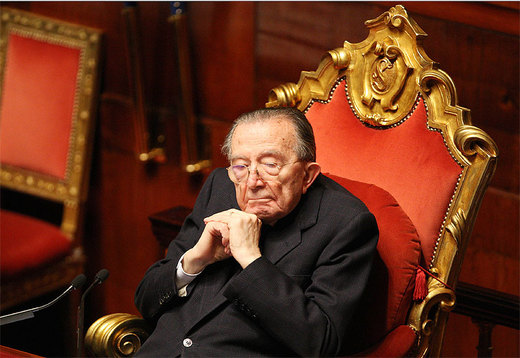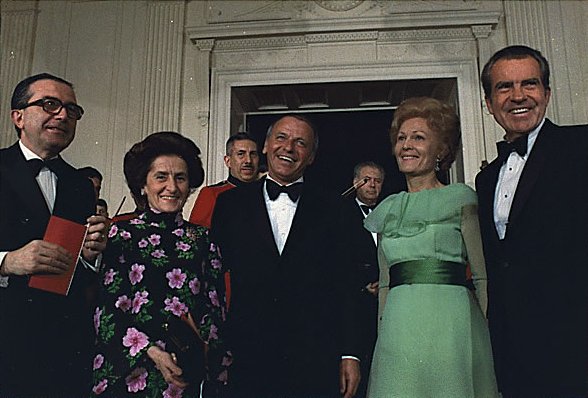<Back to Index>
- Mathematician Alfred Tarski, 1901
- Painter Henri Fantin-Latour, 1836
- Prime Minister of Italy Giulio Andreotti, 1919
PAGE SPONSOR
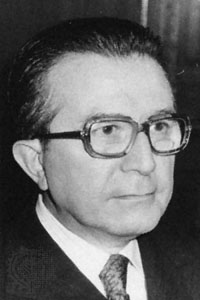
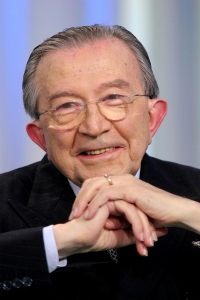
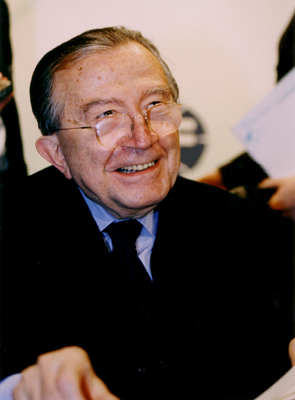
Giulio Andreotti (born January 14, 1919) is an Italian politician of the now dissolved centrist Christian Democratic party who served as the 59th, 62nd and 71st Prime Minister of Italy from 1972 to 1973, from 1976 to 1979, and from 1989 to 1992. He also served as Minister of the Interior (1954 and 1978), Defense Minister (1959 – 1966 and 1974) and Foreign Minister (1983 – 1989), and he has been a Senator for life since 1991. He is also a journalist and author.
He is sometimes called Divo Giulio (from Latin Divus Iulius, "divine Julius", an epithet of Julius Caesar) because of his authority and importance in the history of Italian republican politics. The film Il Divo deals with Andreotti's ties to the Mafia and won the Prix du Jury at the 2008 Cannes Film Festival. Andreotti was born in Rome and studied law there. During his formative political years, he was tightly connected to the Christian Democratic Leader Alcide De Gasperi. Andreotti has sat in Parliament without interruption since 1946, when he was elected to the Constituent Assembly. He was continuously re-elected to the Chamber of Deputies until President Francesco Cossiga appointed him as Senator for life in 1991. He
was the last Christian Democratic prime minister of Italy, serving from
1989 to 1992. His last term was marred by the revelation of the corruption which ultimately destroyed the party. On October 24, 1990, Giulio Andreotti acknowledged before the Chamber of Deputies the existence of Operazione Gladio, a North Atlantic Treaty Organization secret anti-communist structure. During the first stages of Tangentopoli he
was left untouched but in April 1993 he was investigated for having
mafia relations. In 1994 the party of which he was a predominant figure
vanished from the political sphere. On April 14, 1986, during his time as Foreign Minister, Andreotti revealed to the Libyan Foreign Minister, Abdel-Rahman Shalgam, that the United States would bomb Libya the next day in retaliation for the Berlin disco terrorist attack which had been tied to Libya. As a result of the "warning" by the supposed U.S. ally Italy, Libya was better prepared for the retaliatory American strike. Andreotti was investigated for his role in the 1979 murder of Mino Pecorelli, a journalist who had published allegations that Andreotti had ties to the Mafia and to the kidnapping of Prime Minister of Italy Aldo Moro.
A court acquitted him in 1999 after a case that lasted three years, but
he was convicted on appeal in November 2002 and sentenced to
twenty-four years imprisonment. The eighty-three year old Andreotti was
immediately released pending an appeal. On October 30, 2003, an appeals
court over-turned the conviction and acquitted Andreotti of the
original murder charge. That same year, the court of Palermo acquitted him of ties to the Mafia,
but only on grounds of expiration of statutory terms. The court
established that Andreotti had indeed had strong ties to the Mafia
until 1980, and had used them to further his political career to such
an extent as to be considered a component of the Mafia itself. Andreotti
defended himself by saying he took harsh measures against the Mafia
while in government. Andreotti's seventh government (1991–92) did take
a number of decisive steps against Cosa Nostra - thanks to the presence
of Anti-Mafia judge Giovanni Falcone at the Ministry of Justice. "When he says that he took extremely harsh measures against the Mafia, he isn't lying," according to Eugenio Scalfari, the editor of the Rome newspaper La Repubblica.
"I think at a certain point in the late Eighties he realised that the
Mafia could not be controlled. He awoke from his perennial
distraction... and the Mafia, which realised that it could no longer
count on his protection or tolerance, assassinated his man in Sicily." His man in Palermo was Salvo Lima who
was murdered by the Mafia in March 1992. The murder of Lima meant a
turning point in the relations between the Mafia and its reference
points in politics. The Mafia felt betrayed by Lima and Andreotti. In
their opinion they had failed to block the confirmation of the sentence
of the Maxi Trial of 1986 - which had sent scores of Mafiosi to jail - by the Court of Cassation (court of final appeal) in January 1992. As of 2005, he regularly writes articles for Corriere della Sera. He also recorded a TV spot for 3 mobile company, which began airing in November 2005. After the April 2006 general election, Andreotti, aged 87, accepted to be the candidate for the Presidency of the Senate for Silvio Berlusconi's House of Freedoms alliance that was still governing at the time. He was opposed by The Union's Franco Marini and lost to him 156 votes to 165. On 21 January 2008, he abstained from a vote in the Senate concerning Minister Massimo D'Alema's report on foreign politics. This choice, together with the abstentions of another life senator, Sergio Pininfarina, and of two communist senators, caused the government to lose the vote: as a consequence, Prime Minister Romano Prodi resigned.
On previous occasions, Andreotti had always supported Prodi's
government with his vote. Given his close ties to the high ranks of the
Catholic Church, the abstention of Andreotti was read by many as a sort of warning delivered by the Conferenza Episcopale Italiana to the government which at that time was pushing ahead a proposal for legal recognition of unmarried couples, including same-sex couples.
